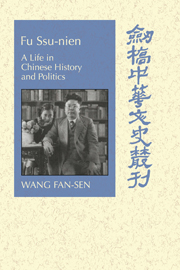Book contents
- Frontmatter
- Contents
- Acknowledgments
- List of Abbreviations
- Chronology
- Introduction: Fu Ssu-nien and Post-1895 Intellectual Trends
- 1 Fu Ssu-nien's Early Years
- 2 The Shaping of a New Historical School
- 3 Toward a Theory of Plural Origins of Chinese Civilization: Hypotheses on Ancient Chinese History
- 4 Contra-Introspective Moral Philosophy
- 5 The Burden of the May Fourth Mentality
- 6 Statism and the Later Days of a May Fourth Youth
- Conclusion: The Defeat of a May Fourth Youth
- Appendix I A Fragment from a Short Story Attacking Ku Chieh-kang
- Appendix II A Transcript of a Conversation between Fu Ssu-nien and Ch'en Pu-lei
- Glossary
- Bibliography
- Index
5 - The Burden of the May Fourth Mentality
Published online by Cambridge University Press: 01 February 2010
- Frontmatter
- Contents
- Acknowledgments
- List of Abbreviations
- Chronology
- Introduction: Fu Ssu-nien and Post-1895 Intellectual Trends
- 1 Fu Ssu-nien's Early Years
- 2 The Shaping of a New Historical School
- 3 Toward a Theory of Plural Origins of Chinese Civilization: Hypotheses on Ancient Chinese History
- 4 Contra-Introspective Moral Philosophy
- 5 The Burden of the May Fourth Mentality
- 6 Statism and the Later Days of a May Fourth Youth
- Conclusion: The Defeat of a May Fourth Youth
- Appendix I A Fragment from a Short Story Attacking Ku Chieh-kang
- Appendix II A Transcript of a Conversation between Fu Ssu-nien and Ch'en Pu-lei
- Glossary
- Bibliography
- Index
Summary
The preceding chapters have considered Fu's role in the making of a new historical school, the challenging working hypotheses of Chinese ancient history he promulgated, and the moral philosophy he championed. These three pursuits represent Fu's major scholarly efforts from 1927 to 1937, or roughly the period from his return to China until the outbreak of the Sino-Japanese War.
But during these relatively peaceful ten years, Fu was also forced to attend to several nonacademic social and political matters. There were, in addition to the controversy over Chinese social history, three important developments that Fu confronted after the Japanese invasion in 1931: the rising tide of nationalism; the rise of political absolutism and a debate over dictatorship and democracy; and the rise of cultural nativism, especially the proclamation of “The Declaration for Cultural Construction on a Chinese Basis” (Pen-wei-wen-hua chien-she hsüanyen) of 1935. These events turned the May Fourth mentality into a burden for many thoughtful intellectuals.
The Debate on the Nature of Chinese Society began around 1928. The issue was how historians correlated their research with social and political events. The rising tide of nationalism and the urgent task of mobilizing the Chinese people to resist Japan after the Mukden Incident in 1931 required a sense of collective worth that challenged the iconoclastic May Fourth youths.
History and Politics
With their belief in linear historical sequence, it was difficult for modern Chinese historians to make a connection between the backward past and a promising future.
- Type
- Chapter
- Information
- Fu Ssu-nienA Life in Chinese History and Politics, pp. 140 - 163Publisher: Cambridge University PressPrint publication year: 2000

